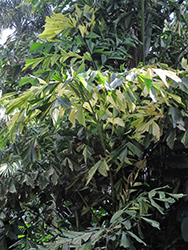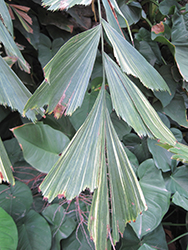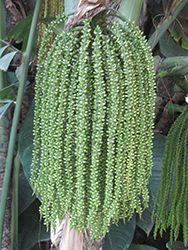It's all about ...
plants

Variegated Fishtail Palm
Caryota mitis 'Variegata'
Height: 25 feet
Spread: 10 feet
Sunlight:
![]()
![]()
![]()
Hardiness Zone: 9b
Description:
This palm typically forms multi-stemmed clusters of slender stems, topped with several large bi-pinnate leaves that can reach 9 feet in length; features green leaflets, with butter-cream variegation; tolerates only very light frost; protect from wind
Ornamental Features
Variegated Fishtail Palm is draped in stunning chains of creamy white flowers hanging below the branches from early to mid summer. It has attractive creamy white-variegated green foliage with hints of buttery yellow. The fan-shaped bipinnately compound leaves are highly ornamental and remain green throughout the winter. The red fruits are held in abundance in spectacular clusters from early to mid fall. The rough gray bark adds an interesting dimension to the landscape.
Landscape Attributes
Variegated Fishtail Palm is a multi-stemmed evergreen tree with a towering form, with a high canopy of foliage concentrated at the top of the plant. Its relatively coarse texture can be used to stand it apart from other landscape plants with finer foliage.
This tree will require occasional maintenance and upkeep, and should not require much pruning, except when necessary, such as to remove dieback. Gardeners should be aware of the following characteristic(s) that may warrant special consideration;
- Messy
- Insects
- Self-Seeding
Variegated Fishtail Palm is recommended for the following landscape applications;
- Accent
- Vertical Accent
- General Garden Use
- Container Planting
Planting & Growing
Variegated Fishtail Palm will grow to be about 25 feet tall at maturity, with a spread of 10 feet. It has a high canopy of foliage that sits well above the ground, and is suitable for planting under power lines. As it matures, the lower branches of this tree can be strategically removed to create a high enough canopy to support unobstructed human traffic underneath. It grows at a slow rate, and under ideal conditions can be expected to live for 40 years or more.
This tree performs well in both full sun and full shade. It does best in average to evenly moist conditions, but will not tolerate standing water. It is particular about its soil conditions, with a strong preference for rich, acidic soils. It is somewhat tolerant of urban pollution, and will benefit from being planted in a relatively sheltered location. This is a selected variety of a species not originally from North America, and parts of it are known to be toxic to humans and animals, so care should be exercised in planting it around children and pets.; however, as a cultivated variety, be aware that it may be subject to certain restrictions or prohibitions on propagation.
Variegated Fishtail Palm is a fine choice for the yard, but it is also a good selection for planting in outdoor pots and containers. Because of its height, it is often used as a 'thriller' in the 'spiller-thriller-filler' container combination; plant it near the center of the pot, surrounded by smaller plants and those that spill over the edges. It is even sizeable enough that it can be grown alone in a suitable container. Note that when grown in a container, it may not perform exactly as indicated on the tag - this is to be expected. Also note that when growing plants in outdoor containers and baskets, they may require more frequent waterings than they would in the yard or garden. Be aware that in our climate, most plants cannot be expected to survive the winter if left in containers outdoors, and this plant is no exception. Contact our experts for more information on how to protect it over the winter months.
This plant is not reliably hardy in our region, and certain restrictions may apply; contact the store for more information.


